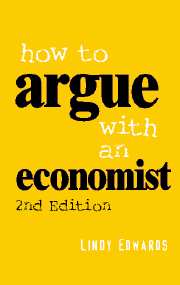Book contents
- Frontmatter
- Contents
- Acknowledgements
- Preface to the Second Edition
- Part I A Historical Juncture
- Part II Getting a Handle on Economics
- Part III Revealing Economic Rationalism's Worldview
- Part IV Arguing with an Economic Rationalist
- Part V The Future
- 16 The way forward
- 17 Making sure ‘she'll be right’
- 18 Recent developments: The values divide in industrial relations reform
- Bibliography
- Index
18 - Recent developments: The values divide in industrial relations reform
Published online by Cambridge University Press: 14 October 2009
- Frontmatter
- Contents
- Acknowledgements
- Preface to the Second Edition
- Part I A Historical Juncture
- Part II Getting a Handle on Economics
- Part III Revealing Economic Rationalism's Worldview
- Part IV Arguing with an Economic Rationalist
- Part V The Future
- 16 The way forward
- 17 Making sure ‘she'll be right’
- 18 Recent developments: The values divide in industrial relations reform
- Bibliography
- Index
Summary
The Tree of Knowledge, the symbolic birthplace of the labour movement, was pronounced dead in 2006. The 200-year-old ghost gum stood in the main street of Barcaldine in western Queensland. In 1891 shearers met under the boughs of the tree in the Great Shearer's Strike. They stood under the tree to plan the march that saw 3000 shearers take to the streets under the Eureka flag to protest poor working conditions and low wages. As the last-wave industrial relations laws came into effect the tree was deliberately poisoned. It was a symbolic gesture that marked the end of the labour movement and the end of an era for Australia.
The Howard years have, mostly, been marked by a creeping tide. The government has implemented its agenda inch by inch. It has surreptitiously gone about its economic policy reforms. It has made few sweeping symbolic gestures. The great exception has been its industrial relations policy. The government was bursting with pride as it pushed through its WorkChoices legislation. The Prime Minister declared, ‘There has been a historic shift in this country over the last decade, and there can be no turning back, our economy has changed forever as a result of industrial relations de-regulation.’
The wage arbitration system was one of the cornerstones of the Australian Settlement. It was the institutional foundation of the commitment to high wages and quality of life for working people.
- Type
- Chapter
- Information
- How to Argue with an EconomistReopening Political Debate in Australia, pp. 163 - 174Publisher: Cambridge University PressPrint publication year: 2007

